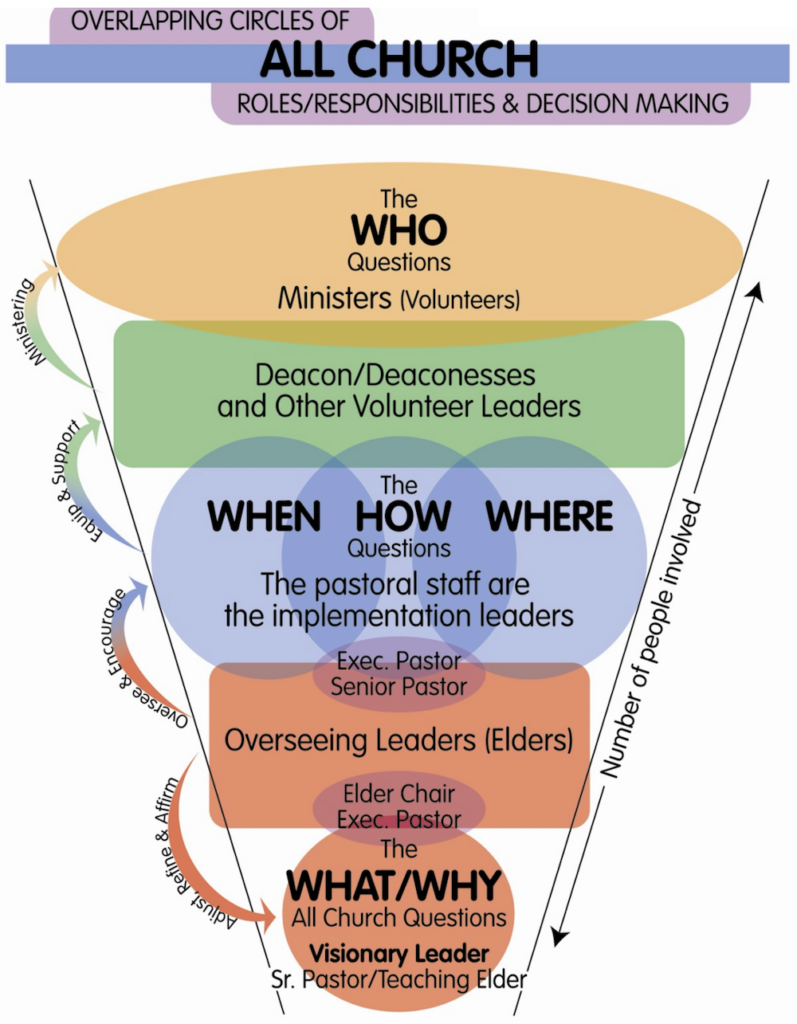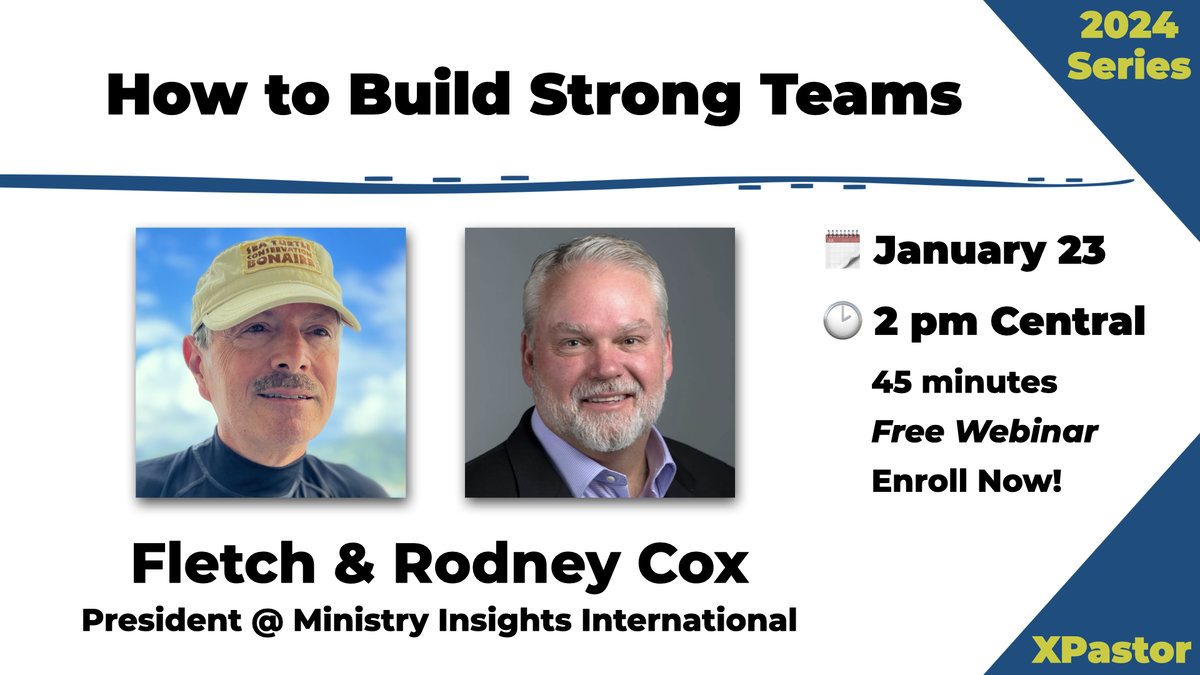for a Staff Led and Elder Oversight Church Polity
This article is from 2022 and expands on Bob’s article from 2007 which can be read here.
At some point in the life of many churches the roles and leadership responsibilities of the “staff” and “board” come into question and need a thoughtful review. This seems to be especially true in multi-staff non-denominational settings. In the early days of such churches, the vision alone is often sufficiently galvanizing to unite both paid staff and volunteer oversight leaders through various forms elder and/or administrative boards. But as the church grows in numbers and complexity both the staff and overseers experience a shift in their on-going activities and expectations.
When this occurs, it is not uncommon that a review, and in many cases a refinement, of those roles and the increasing responsibilities require a prayerful process. Having personally experienced this in multiple churches where I served as XP and increasingly in churches where I have consulted; it became helpful to develop a graphic representation and a written narrative of these overlapping levels of expectations and decision-making authority.
I have used the organizing format of “Who Answers Which Questions” that seems to have helped many gain a 30,000 ft view of this challenge. The following diagram and notes represent the cumulative results from multiple churches and can be used to create a framework for making these complex organizational issues as clear as possible. The diagram is very intentional in using the inverted pyramid to demonstrate the principle that members are the ministers and the staff and elders the organizing leaders.
No two churches are the same and in each case the vision, values, polity, and scriptural understanding will mold the final document. It will also be important that the giftedness of the staff and volunteers be recognized, and the details of each groups’ responsibilities be developed to accommodate these distinctives for effective continued growth and organizational clarity. If you are facing some of these questions, this document can be a useful discussion starter and the skeleton for a final tailor-made version for each unique church setting.
General Biblical Principles
God’s Kingdom work has always been entrusted to flawed but sovereignly selected leaders, who must work together in loving submission and community for the sake of the ministry.
- God communicates a “Vision” or “future shape” of a ministry to a leader or leaders through a “key leader,” which in the case of the church is the “teaching Elder/Pastor,” which is why he is said to be worthy of “double-honor.”
- God uses multiple Elders to oversee the church to magnify, affirm and refine the vision that God has given to the “teaching Elder/Pastor.”
- God expects that once a vision is agreed upon, the entire leadership team adopt the role of executing and fulfilling the vision with equal enthusiasm.
- God expects all leaders to appropriately share information and opportunities to those in the body that are gifted and willing to help lead and implement that vision as broadly and powerfully as possible.
- God expects that the lines of communication within His church be clear, understood and followed.
- God expects His people to handle overlapping roles with integrity and humility in submission to one another.

Vision
- Elders—Affirm or redirect overall vision.
- Senior Pastor—Receive overall vision, present to elders for affirmation. Communicate it to the body and staff. Review and approve vision for area ministries.
- Executive Pastor—Help the Senior Pastor formulate and clarify vision. Implement the vision with the staff. Review and approve vision for area ministries for conformity with the overall vision.
- Staff—Offer input on overall vision. Implement the overall vision. Set the vision for their area of ministry, subject to approval of the Executive Pastor.
Strategic Planning
- Elders—Review and receive input in the formulation stage of the strategic planning. Sign off on major ministry goals.
- Senior Pastor—Formulate major ministry goals with Executive Pastor based on overall vision.
- Executive Pastor—Lead strategic planning process. Assist the Senior Pastor in formulating and clarifying major goals and work with staff in setting operational goals.
- Staff—Set the strategic plan for their areas of ministry, subject to approval of the Executive Pastor.
Policy
- Elders—Formulate position statements and related policies, based on Scripture for finances, church discipline, etc.
- Senior Pastor—Same as elders.
- Executive Pastor—See that above policies are recognized in the ministry operations of the Church. Formulate operational policies and procedures.
- Staff—Implement and carry out overall policies and procedures for their area of ministry, consistent with overall policies.
Administration
- Elders—Give general oversight to assure that purpose, position statements and policies are carried out consistently. Hold overall fiscal responsibility. Give general oversight by monitoring reports.
- Senior Pastor—Consult with the Executive Pastor regarding overall administration.
- Executive Pastor—Carry direct responsibility for ministry, administration, and operations of the church.
- Staff—Give direct responsibility for ministry, administration, and operations of their various areas of ministry.
Pastoral Staff
- Elders—Senior Pastor selection and evaluation. Consult and advise on the hire/fire of pastoral staff and have final decision. Receive recommendations on the establishment of new positions, benefits, and salary guidelines from the XPastor.
- Senior Pastor—Nurture the pastoral team (personal and group).
- Executive Pastor—Develop the team to carry out the vision and goals. Coach and mentor pastoral team. Administrate church staff. Recommend hiring/firing of pastoral team and administer the process. Recommend the establishment of new pastoral team positions. Recommend changes, as necessary, to the salary guidelines and benefits.
- Staff—Recommend to the XPastor needed changes in new positions, hire/fire, or new policies in their own ministry departments to the Executive Pastor.











